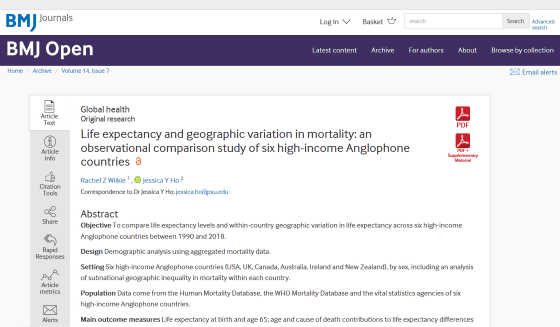There is a huge disparity in life expectancy even among developed English-speaking countries. Which country has the longest life expectancy?

Many countries where English is an official language were once British colonies and share many commonalities, but a new study has found that even among developed English-speaking countries, there are large differences in the life expectancy of their citizens.
Life expectancy and geographic variation in mortality: an observational comparative study of six high-income Anglophone countries | BMJ Open

People in One English-Speaking Country Seem to Live Years Longer : ScienceAlert
https://www.sciencealert.com/people-in-one-english-speaking-country-seem-to-live-years-longer
A research team led by health scientist Rachel Wilkie of the University of Southern California and sociologist Jessica Ho of Pennsylvania State University looked at the bigger picture of life expectancy in high-income English-speaking countries. 'Life expectancy in high-income countries represents the frontier of what is achievable in settings with high standards of living and abundant resources to improve health and well-being,' the team wrote in their paper.
The study used data from the World Health Organization's (WHO) mortality database and national vital statistics agencies to compare data from 1990 to 2018 in six English-speaking countries: the United States, Canada, the United Kingdom, Ireland, Australia, and New Zealand.
The research team points out that 'these countries share a common language and some cultural similarities (e.g., diet and lifestyle), and they also share high current and historical income inequality. ' In addition to assessing life expectancy at birth and at age 65, the study also analyzed differences in mortality rates from various causes and whether life expectancy differs across regions of each country.

The analysis found that Australia performed best compared to other countries, with particularly low mortality rates for both men and women aged 45 to 84. 'Australia has the clear highest life expectancy at birth, leading the way by 1.26 to 3.95 years for women and 0.97 to 4.88 years for men in 2018,' the team wrote in their paper.
In particular, Australia had lower mortality rates than other countries for cardiovascular and respiratory diseases, cancer, perinatal diseases, congenital diseases, and neurodegenerative diseases such as Alzheimer's. In addition, Australia has lower rates of firearm homicide, suicide, and drug overdose deaths compared to other countries, which also contribute to the long life expectancy.
The low risk of death from these diseases in Australia is thought to be due to an excellent healthcare system in place, including cancer screening and treatment, vaccinations for infectious diseases such as influenza, and a system for preventing, diagnosing and treating cardiovascular disease.
Meanwhile, Canada, known for its high-quality public health care system, had the second-highest life expectancy at birth, but New Zealand and Ireland have been catching up in recent years. Ireland in particular saw its life expectancy at birth increase by 8.29 years for men and 6.66 years for women over the survey period, a remarkable improvement from its previous ranking of last place.
The United States has had the lowest life expectancy at birth since 2001. Based on 2019 data, Australian men are expected to live nearly five years longer than American men.

When analyzing each country by geographical division, it was found that in the UK and Ireland, life expectancy was roughly the same regardless of where you lived in the country, but in Australia, life expectancy was slightly lower for people living in the Northern Territory in the north. This is thought to be due to the high proportion of indigenous Aboriginal people in the population and the high disease burden among Aboriginal people.
'Australia could serve as a model for other developed English-speaking countries, such as the United States and the United Kingdom, to reduce premature mortality,' the team said.
Related Posts:
in Science, Posted by log1h_ik







